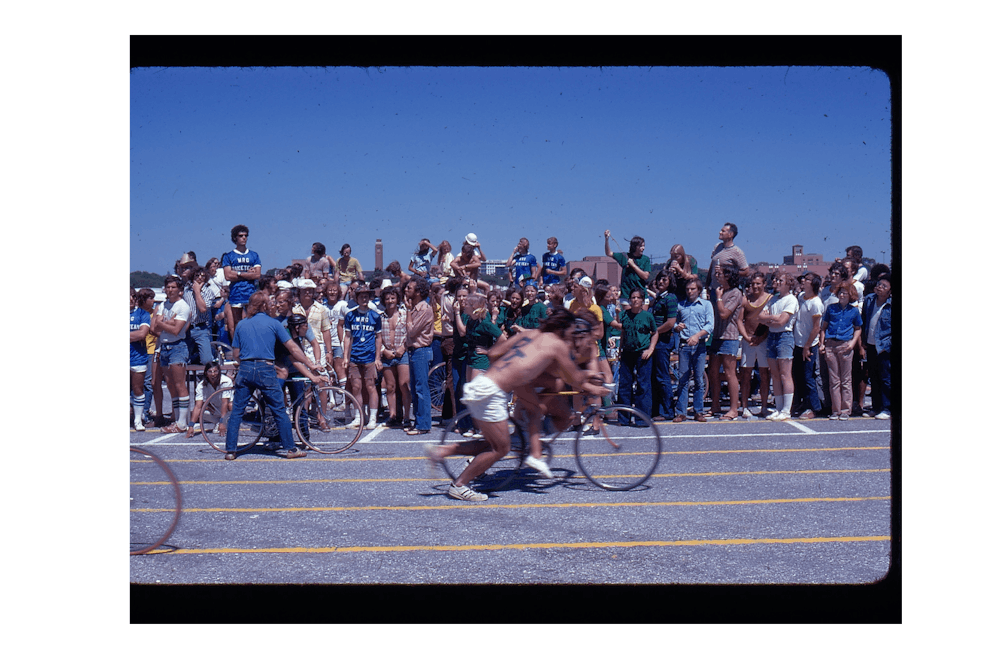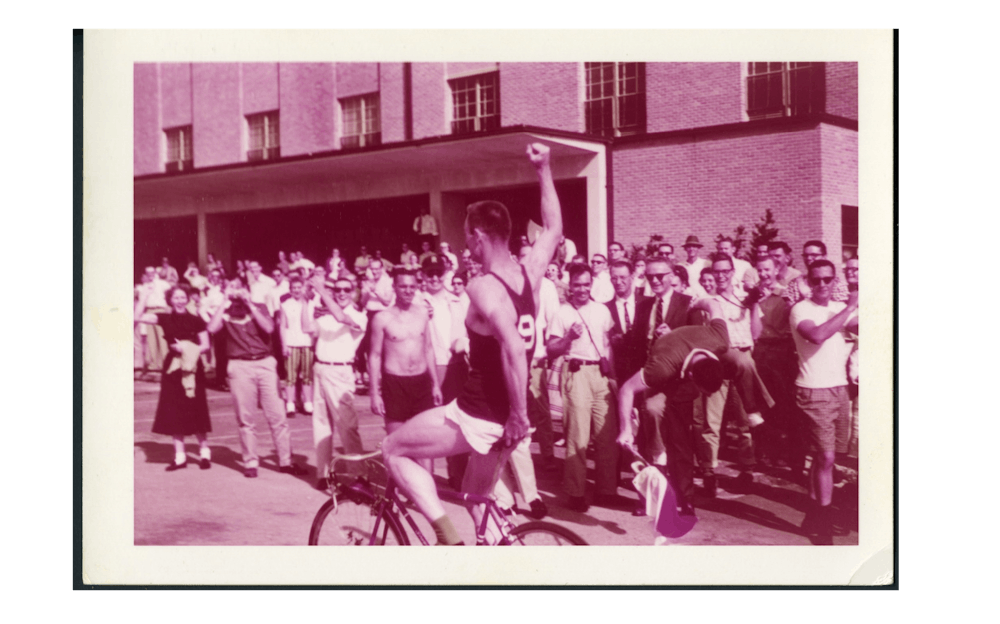‘Screwball antics’: Tracing the history of Beer Bike

Last week, the Thresher released a letter from the editor’s desk lamenting strict Beer Bike safety precautions that have started to chip away at the event’s tradition. The Thresher spoke to alumni and dug into the archives to explore the inception of Beer Bike and its storied history.
Controversial beginnings
Originally coined the “Inter-College Bike Race,” Beer Bike was born in May 1957, shortly after Rice created its residential college system. The Inter-College Bike Race coincided with Rondelet at the time, but the essence of the event — copious amounts of alcohol and the “eccentric nature of European racing bikes” — has remained the same over the decades.
One notable difference: in the early days, the bikers were also the chuggers.
“The Administration approved the beer drinking requirement for the race late last week so all riders will be required to consume an unspecified amount of the brew at the half way point of each lap,” the Thresher wrote in its May 3, 1957 issue.
Baker did come first, winning the inaugural Beer Bike, according to the Thresher’s May 10, 1957 issue. Hanszen had an eventful race — they won the beer consumption, were disqualified from the races for taking a shortcut and, much to Baker’s chagrin, stole one of their $80 new bicycles, equivalent to $833 today.
In March 1958, Rice’s Physical Education Department threatened to end their sponsorship of the race if beer remained involved. The administration decided to allow beer, and the Thresher later deemed the mid-race chugging stops “traditional.”
By 1961, the pushback had seeped into the larger Houston community. The Chronicle published an editorial titled “Students’ screwball antics question value of education,” criticizing Beer Bike and other recent student controversies.
The Thresher produced a sardonic editorial in response.
“Obviously the fact that college students don’t spend 24 hours a day in lab trying to beat the Russians hints at Red subversion of our universities,” the Thresher wrote on May 5, 1961. “For God’s sake don’t knock your allegedly depraved sons and daughters who are trying to understand the mess you have placed us in and find a way out of it … Monkeys beget monkeys, Mr. Editor.”
A letter from an alumnus pleaded with the administration to disregard the Chronicle’s “asinine” editorial.
“The trouble with people like those that write editorials of that nature is that they have totally forgotten what it was like to be young,” Donald Gibbon (’58) wrote. “Please don’t let these people talk you into outlawing one of the last vestiges of what was once not only an instructive, but enjoyable college career.”

Retaining ‘Southern Belle Gentility’
Women participated sparingly in the early Beer Bike races. In 1966, they created their own.
Tea Trike, as described in Thresher articles headlined “Girls to race with tea, tricycles” and “Girls to ride, guzzle,” was a race between Jones and Brown colleges, both of which were all-women’s colleges at the time.
“The tea will be chugged from the flower-covered beer cans, thus retaining an air of Southern Belle Gentility,” the Thresher wrote.
The race would be only slightly modified from the men’s race — fewer bikers and chuggers and a shorter track — except for the “seats on the seat” rule.
“[The] posterior must remain on the seat to avoid undue motion which may detract from the race,” according to a quote from Gail Drayton, a then-Brown College sophomore.
Tea Trike ended after its sixth rendition in 1972, a year after the residential colleges started to become co-ed and women finally began participating in Beer Bike.

‘They decided women could drink beer and ride real bikes’
By 1968, the track moved from the Inner Loop to the eastern side of Rice Stadium, now occupied by West Lots 2 and 3 and the George R. Brown Tennis Courts, according to Thresher archives.
Men had started practicing in Hermann Park at night, Mike Alsup (’73) said. Teams would do a “zoo lap,” the one-mile circle around what is now the Houston Zoo.
“In those days, Hermann Park after dark was a warzone,” Alsup, a Wiess College graduate, added. “It was the place that a girl would just never go because bad things happened in Hermann Park.”
A few years later, Alsup became a Beer Bike captain at Wiess, where he participated in what the Thresher termed the “corporate Beer-Bike era.”
“Winning became a sport that you train for,” Alsup said. “The drinkers were training year round, let’s face it, but [the race] just became stronger and better.”
By 1977, teams had collected sponsors such as Coors and Michelob and sought advice from biking enthusiasts, according to Alsup.
Karen Jones (’78), a Jones College alum, was an “iron woman” during her time at Rice. Iron women rode first, then chugged for another rider later in the race, she said.
“The tea [and] trike days were over by the time I arrived at Rice in 1974. I’m not sure when they decided that the women could drink beer and ride real bikes,” Jones said. “I remember very little about the bike training … What I remember more vividly was the beer training part of it.”
In fact, Jones said she was a “beer captain.” During the year, she kept a large vat of beer in her dorm room to warm and decarbonate.
“It was terrible. I would probably say smell is the longest lasting memory,” Jones said. “I bet if you had a flat can of Texas Pride today, I would be transported back to my dorm room.”
Jones College women would practice with the warm, flat beer, or occasionally water, in the bathroom with custom-made cans. Students would cut holes in empty beer cans and seal the outside with wax, according to Kathy Behrens (’80).
The traditions didn’t end at flat beer. According to Lydia Asselin (’79), women also wore foam and hairnet helmets that offered little during the races.
“[They] were contraptions made of strips of soft foam and vinyl that were about as useful as wearing an Easter basket,” Asselin wrote in an email to the Thresher. “No streamlined clothing, no fancy bicycles.”
Helen Travis Savitzky (’80) seconded Asselin’s memory of foam helmets, recalling the number of risks associated with Beer Bike during her time.
“I was a rider, not a chugger,” Savitzky said. “You needed to get a good start, and there was very little room to stop. I can remember being bruised on my upper arms after being caught. We practiced quite a bit, and the timing of chugging and riding was a delicate balance … I do not know of any serious accidents, but there was certainly risk involved.”
Risks aside, Tsz Wong (’11) said Beer Bike helped her feel included in Rice culture while avoiding the drinking aspect. Despite how Rice markets itself, Wong says that Beer Bike is still one of the only events that she considers family-friendly.
“Rice tries to market other events as big milestone alumni-gathering events, but I still only view Beer Bike and my own reunion as something worth coming to [as] a family,” Wong said.

Present day
Now, mid-race chugs, flowery beer cans and foam helmets have all been abandoned. Recently, Beer Bike witnessed plenty of rules implemented to ensure student safety – a concept that hadn’t previously been at the forefront of administration’s priorities.
“The whole concept of in loco parentis, where [Rice is] taking a really protective view of the students, wasn’t so much,” Alsup said. “This was not an activity that had a security component to it … This was still Rice, a Texas school, where cowboys went to school.”
Amid current concerns over splitting the races into heats and the possibility of breathalyzing chuggers, alumni remained divided over administration’s recent moves toward safety, echoing student sentiment about keeping the tradition of Beer Bike alive.
“I have mixed feelings about all things related to drinking,” Jones said. “I know, as a mother [and] as an adult, I would support [rules]. But frankly, I’m kind of glad I got to participate in an era where there weren’t as many rules and everybody just could kind of go out.”
More from The Rice Thresher

Worth the wait: Andrew Thomas Huang practices patience
Andrew Thomas Huang says that patience is essential to being an artist. His proof? A film that has spent a decade in production, a career shaped by years in the music industry and a lifelong commitment to exploring queer identity and environmental themes — the kinds of stories, he said, that take time to tell right.

Andrew Thomas Huang puts visuals and identity to song
Houston is welcoming the Grammy-nominated figure behind the music videos of Björk and FKA twigs on June 27.

Live it up this summer with these Houston shows
Staying in Houston this summer and wondering how to make the most of your time? Fortunately, you're in luck, there's no shortage of amazing shows and performances happening around the city. From live music to ballet and everything in between, here are some events coming up this month and next!

Please note All comments are eligible for publication by The Rice Thresher.